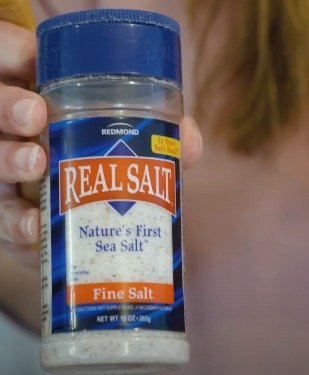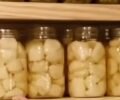Preserve Fresh Lemons for an Entire Year: A Step-by-Step Guide

lemon
salt
water
1
Are you tired of wasting lemons because they spoil before you can use them all? I'm thrilled to share with you a method that keeps lemons fresh and juicy for an entire year! Whether you're a fan of sweet lemon bars or savory lemon chicken, this preservation technique will ensure you always have fresh lemons on hand.
The Secret to Year-Long Fresh Lemons
In March of last year, I preserved a batch of lemons, and now, almost a year later, they are still plump, juicy, and vibrant. The key to this preservation method is fermenting the lemons, which keeps them fresh and flavorful for a whole year. Here’s how you can do it too.
Two Methods for Fermenting Lemons
Method 1: Traditional Fermented Lemons
This traditional method involves cutting the lemons into quarters while keeping them intact at the bottom, salting the inside, and packing them tightly into a jar. The salt draws out the lemon juice, which, combined with a 3% saltwater brine, helps in preserving them. This method works well for savory dishes but may be too salty for baking.

2
Method 2: Whole Fermented Lemons
For a versatile approach, leave the lemons whole. This method involves packing whole lemons tightly into a jar and covering them with the same saltwater brine. The whole lemons absorb less salt, making their juice suitable for both savory and sweet recipes.
Step-by-Step Guide to Preserving Lemons
Ingredients and Equipment:
Organic lemons (ensure they are washed well with hot soapy water)
Quality salt (I use Redmond's Real Salt)
Filtered or distilled water
Large glass jars with lids
Preparing the Saltwater Brine:
Brine Ratio: Use 1 tablespoon of salt for every 2 cups of water.
Mixing the Brine: Dissolve the salt in warm water. For this recipe, mix 2 tablespoons of salt into 4 cups of warm water. Stir until the salt is mostly dissolved. It’s okay if some of the mineral deposits from the salt remain.

3
Packing the Jars:
Pack the Lemons: Place whole or quartered lemons into the jars. Pack them tightly to minimize air pockets.
Adding the Brine: Pour the saltwater brine over the lemons, ensuring they are completely submerged. The shoulder of the jar will help keep the lemons beneath the liquid level without needing a weight.

4
Fermentation Process:
Room Temperature Fermentation: Let the jars sit at room temperature for a few days to start the fermentation process.

5
Cold Storage: After a couple of days, transfer the jars to cold storage. This could be a refrigerator or a cool room that stays at least 50°F or colder.
Using Preserved Lemons
Savory Dishes: The traditional method's salty lemons are perfect for savory recipes like lemon garlic chicken or lemon rosemary potatoes.
Sweet Recipes: The whole fermented lemons, with their milder salt content, can be used for baking lemon bars or adding to citrus cookies.
Pro Tips
Organic Lemons: Always use organic lemons to avoid pesticides, especially since you will preserve them with the peel.

6
Reusing Jars: You can repurpose glass jars from products like coconut oil. Clean them thoroughly with hot soapy water before using them for preserving lemons.

7
Enjoy Fresh Lemons All Year Long
By using these simple methods, you can enjoy the vibrant taste and juiciness of fresh lemons year-round. This not only saves money but also ensures you have a ready supply of lemons for any culinary adventure. Happy preserving!

Ingredients
lemon
salt
water
Directions
1
Are you tired of wasting lemons because they spoil before you can use them all? I'm thrilled to share with you a method that keeps lemons fresh and juicy for an entire year! Whether you're a fan of sweet lemon bars or savory lemon chicken, this preservation technique will ensure you always have fresh lemons on hand.
The Secret to Year-Long Fresh Lemons
In March of last year, I preserved a batch of lemons, and now, almost a year later, they are still plump, juicy, and vibrant. The key to this preservation method is fermenting the lemons, which keeps them fresh and flavorful for a whole year. Here’s how you can do it too.
Two Methods for Fermenting Lemons
Method 1: Traditional Fermented Lemons
This traditional method involves cutting the lemons into quarters while keeping them intact at the bottom, salting the inside, and packing them tightly into a jar. The salt draws out the lemon juice, which, combined with a 3% saltwater brine, helps in preserving them. This method works well for savory dishes but may be too salty for baking.

2
Method 2: Whole Fermented Lemons
For a versatile approach, leave the lemons whole. This method involves packing whole lemons tightly into a jar and covering them with the same saltwater brine. The whole lemons absorb less salt, making their juice suitable for both savory and sweet recipes.
Step-by-Step Guide to Preserving Lemons
Ingredients and Equipment:
Organic lemons (ensure they are washed well with hot soapy water)
Quality salt (I use Redmond's Real Salt)
Filtered or distilled water
Large glass jars with lids
Preparing the Saltwater Brine:
Brine Ratio: Use 1 tablespoon of salt for every 2 cups of water.
Mixing the Brine: Dissolve the salt in warm water. For this recipe, mix 2 tablespoons of salt into 4 cups of warm water. Stir until the salt is mostly dissolved. It’s okay if some of the mineral deposits from the salt remain.

3
Packing the Jars:
Pack the Lemons: Place whole or quartered lemons into the jars. Pack them tightly to minimize air pockets.
Adding the Brine: Pour the saltwater brine over the lemons, ensuring they are completely submerged. The shoulder of the jar will help keep the lemons beneath the liquid level without needing a weight.

4
Fermentation Process:
Room Temperature Fermentation: Let the jars sit at room temperature for a few days to start the fermentation process.

5
Cold Storage: After a couple of days, transfer the jars to cold storage. This could be a refrigerator or a cool room that stays at least 50°F or colder.
Using Preserved Lemons
Savory Dishes: The traditional method's salty lemons are perfect for savory recipes like lemon garlic chicken or lemon rosemary potatoes.
Sweet Recipes: The whole fermented lemons, with their milder salt content, can be used for baking lemon bars or adding to citrus cookies.
Pro Tips
Organic Lemons: Always use organic lemons to avoid pesticides, especially since you will preserve them with the peel.

6
Reusing Jars: You can repurpose glass jars from products like coconut oil. Clean them thoroughly with hot soapy water before using them for preserving lemons.

7
Enjoy Fresh Lemons All Year Long
By using these simple methods, you can enjoy the vibrant taste and juiciness of fresh lemons year-round. This not only saves money but also ensures you have a ready supply of lemons for any culinary adventure. Happy preserving!

Leave a Review
Please log in or register for a new account in order to leave a review.










